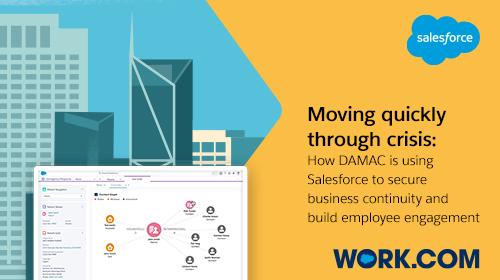In February and March of 2020, even as the COVID-19 crisis was raging in Asia, life was carrying on as normal in much of the rest of the world. As a result, many businesses in Europe and the Middle East didn’t foresee the disruptive threat that the disease posed and the radically changed landscape that would emerge in its wake. But the Dubai-based real estate company Damac saw the clouds on the horizon and viewed the early part of the year as an opportunity for them to prepare for the road ahead.
That’s not to say it’s been easy. Some sectors are well-placed to pivot to remote working, but the real-estate business is inherently personal – potential buyers want to see the high-end residential and commercial properties that Damac provides in person before they make a commitment, and deals are sealed with a handshake.
At Damac, the high-value nature of their sector means that every lead is hugely valuable, so it’s essential that identities are verified and transactions are tracked. In order to pivot to a remote business model, Damac had to use all of the tools at their disposal to find an integrated yet secure way of working that kept employees connected – and clients engaged.
Thierry Nicault, Senior Regional Vice President of Salesforce, spoke to the CIO of Damac to find out how they prepared for the crisis, and what their ‘new normal’ looks like.
How did you stabilise your business and ensure continuity during the COVID-19 crisis?
Damac: It was definitely one of the bigger challenges we faced. The norm for our industry is for everyone to be office-based, and for sales to happen in physical spaces – we rely on building personal connections, and remote working is almost unheard of. When COVID-19 started to take hold, we knew that we would have to pivot quickly to enable a team of 300 agents to work from home.
One of the first obstacles was making sure that all the apps we needed could be used securely from home, while still integrating effortlessly with the necessary systems and tools. We started this work in February – we mobilised 1500 users to be able to work remotely, which was huge. Security is crucial for us, so we integrated single-sign-on (SSO) solutions to make it possible to access sensitive data securely.
We also saw that physical meetings would be an issue. Clients are used to coming into our office to schedule appointments or to complete transactions. So in early March, we integrated our scheduling with Salesforce, so that customers can go to our website and schedule a virtual viewing, or a virtual handover of keys.
All of our 300 call-centre agents – working across sales and collections – also needed to move to work from home. This was a huge challenge because we’d never done anything like it before.
How did you use Salesforce Service Cloud to ease the transition to remote working?
Damac: Our call centres run solely on Salesforce, and we leveraged extensions to allow our agents to make calls – and video calls – through the platform, using secure numbers for data privacy. Everything worked seamlessly – it was a big win for us. The call quality was great, and we were able to monitor and audit usage data to ensure security and compliance.
Did you build out new processes during this time?
Damac: We built a new version of our agent-facing app, leveraging Salesforce functionality. The app allows agents to block-book spaces for viewings and schedule bookings and even set up payment plans. Agents have access to all the client data that we hold in Salesforce, allowing them to be fully mobile while remaining productive.
We also created a new 3D visualisation tool to allow clients to customise their apartments – you can check it out on Damac.com. The scheduling for this tool is powered by Salesforce, and the customer data that we obtain during the process is integrated with Salesforce, too, making future contacts more meaningful.
What’s next in Damac’s digital transformation?
Damac: The offices are open again, but our digital transformation isn’t slowing down, it’s accelerating. We’re expanding our use of machine learning to help us to find the information we need immediately, across all areas of the business. And we’re focusing on data quality, as well as accessibility.
We were already running on the cloud, and Salesforce already provided us with a 360-degree view of the customer – that hasn’t changed. But the buy-in for digital ways of doing business has increased dramatically: before COVID-19, 5% of agents were comfortable handling virtual calls before the crisis, now 85% are on board. COVID-19 changed not just tools, but also mindsets, and provided the impetus for employees to try new ways of working.
Damac was able to stay ahead of crisis by remaining agile and being able to pivot towards remote working.
For more advice and solutions for getting back to work in the current climate, check out work.com.




